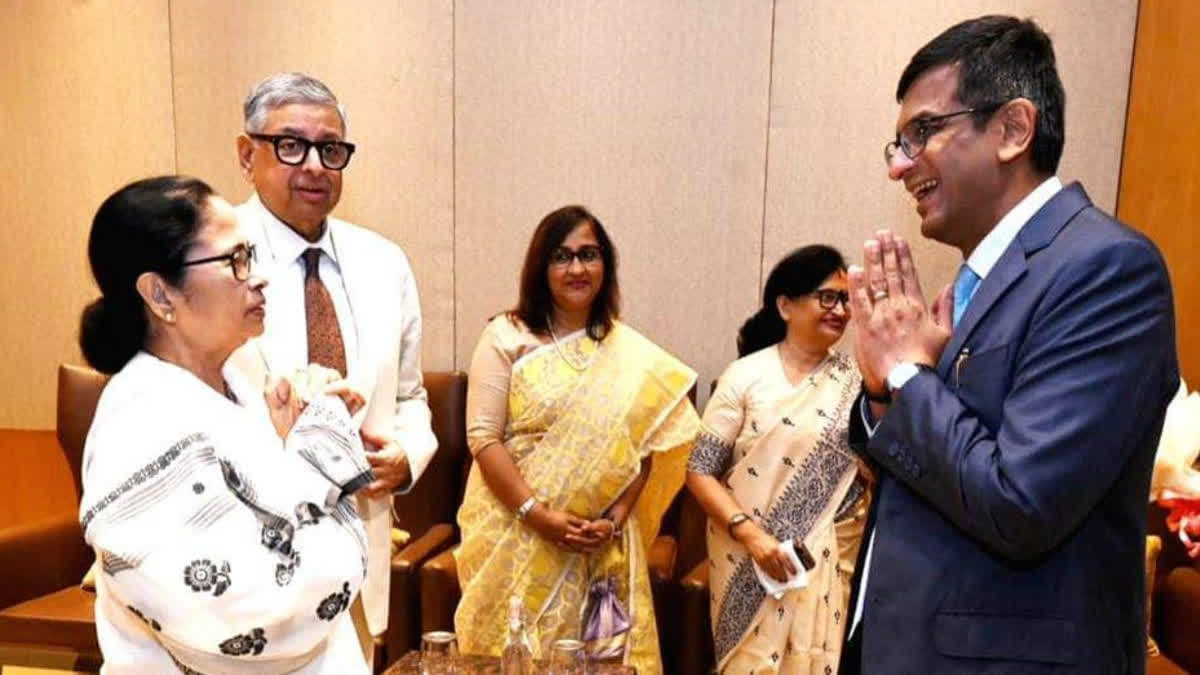Kolkata: Maintaining that "constitutional morality" is a restraining factor on the state, Chief Justice of India D Y Chandrachud on Saturday said it allows for conditions that respect diversity, promote inclusion and pursue tolerance.
He said that India does not exist only in large cities, but it goes down to the smallest village and the smallest taluka across the nation, connected or not, accessible or otherwise. CJI Chandrachud said "constitutional morality", unlike morality, which he said is a restraint on the rights of citizens, is a restraining factor on the state.
Constitutional morality addresses itself to every component of society and allows for conditions which "respect diversity, promote inclusion and pursue tolerance, he said, delivering the keynote address at the two-day East Zone II regional conference of the National Judicial Academy. The CJI said it also imposes a duty on the state to facilitate the achievement of the kind of society that the Constitution envisages.
"The Constitution uses the expression morality, but it does not use the expression constitutional morality," he said. CJI Chandrachud said the Constitution allows for restrictions to be imposed by law on the right to freedom and expression on various grounds, including morality. He said the Constitution also contemplates that restrictions can be imposed on the right to freedom of association on grounds of morality.
At one level, constitutional morality is founded in the values which the Constitution's Preamble sets out, he said. "Constitutional morality is an overarching principle which is derived from, but is not confined to, specific rights or values which are enshrined in the Constitution," CJI Chandrachud said. According to him, it gives a unifying constitutional ethic so that every Indian citizen can think and speak as he wishes to, worship as they intend to, follow whoever they want to, eat what they want to and marry whoever he or she wants to or not marry at all.
When judges are addressed as 'Honor', Lordships' or Ladyships', there is a grave danger that "we perceive ourselves as the deities in those temples since the people say the court is a temple of justice, he said. The CJI said he would rather recast the role of the judge as server of the people, thus bringing in the notion of compassion and empathy.
He said that these concepts of constitutional morality are key for not just the judges of the higher judiciary, but also for the district judiciary as engagement of common citizens begins at this level. It is being increasingly found that judges write about their own ideologies in judgments, CJI Chandrachud noted. He said personal perceptions of a judge as to what is right or wrong must not override constitutional morality.
"Please remember that we are servants of the Constitution, we are not masters of the Constitution," the CJI said. He said a just society cannot be a reflection of a judge's imagination, but it is what the Constitution has envisaged. "That is a society which is based on human dignity, fraternity, equality, liberty, respect for all, tolerance for all and inclusion for all," said CJI Chandrachud.
Maintaining that language is a major barrier for common people for whom the laws and the legal system is meant, he said technology has enabled the Supreme Court to take the initiative to translate 37,000 judgments passed by it in the last 75 years in all the languages recognised in the Constitution, including Bengali.
He emphasised on writing of judgments in a simple form, keeping in mind that these are meant for litigants, who are common people. The CJI also said the Supreme Court is experimenting with artificial intelligence. The apex court is on the anvil of starting to replace human intervention in the verification of cases for defects, like payment of court fees or whether every page has been signed.
Delivering a special address at the programme, West Bengal Chief Minister Mamata Banerjee appealed to members of the judiciary to ensure that political bias should not interfere with the justice delivery system. Chief Justice of Calcutta High Court T S Sivagnanam was also present at the programme, which was organised in collaboration with the Calcutta High Court and West Bengal Judicial Academy.
Judiciary must be absolutely pure, free of political bias: Mamata
West Bengal Chief Minister Mamata Banerjee on Saturday called for a judiciary free of any political bias, maintaining that it should be absolutely pure and honest. Banerjee also said the judiciary is the big pillar of India's foundation to save democracy, the Constitution and people's interests.
"Please see to it that (there is) no political bias in the judiciary. The judiciary must be absolutely pure, honest and sacred. Let people worship it," the CM said at the inauguration of the regional conference.
The judiciary is an important temple for people and the supreme authority for delivering justice, Banerjee said. It is like a mandir, masjid, gurudwara and girja (church). The judiciary is of the people, by the people and for the people... and the last frontier for getting justice and upholding constitutional rights," she said.
Alleging that people from the northeast and the Andaman and Nicobar Islands, from where judges and judicial officers are participating in the conference, are neglected, she urged that they be given bigger opportunities. Hailing CJI Chandrachud for initiating digitisation and e-laws in courts, Banerjee asserted that West Bengal is number one among all states in e-governance.
The chief minister said her government has spent Rs 1,000 crore for development of judicial infrastructure in the state, and provided land for a new high court complex in Rajarhat New Town. Stating that 88 fast track courts are functioning in the state, Banerjee said earlier, the central government provided assistance for setting up these courts, but the provision has been withdrawn since the last seven to eight years. "Out of the 88 fast track courts, 55 are for women. There are six POCSO courts as well," she added. (With Agency inputs)



